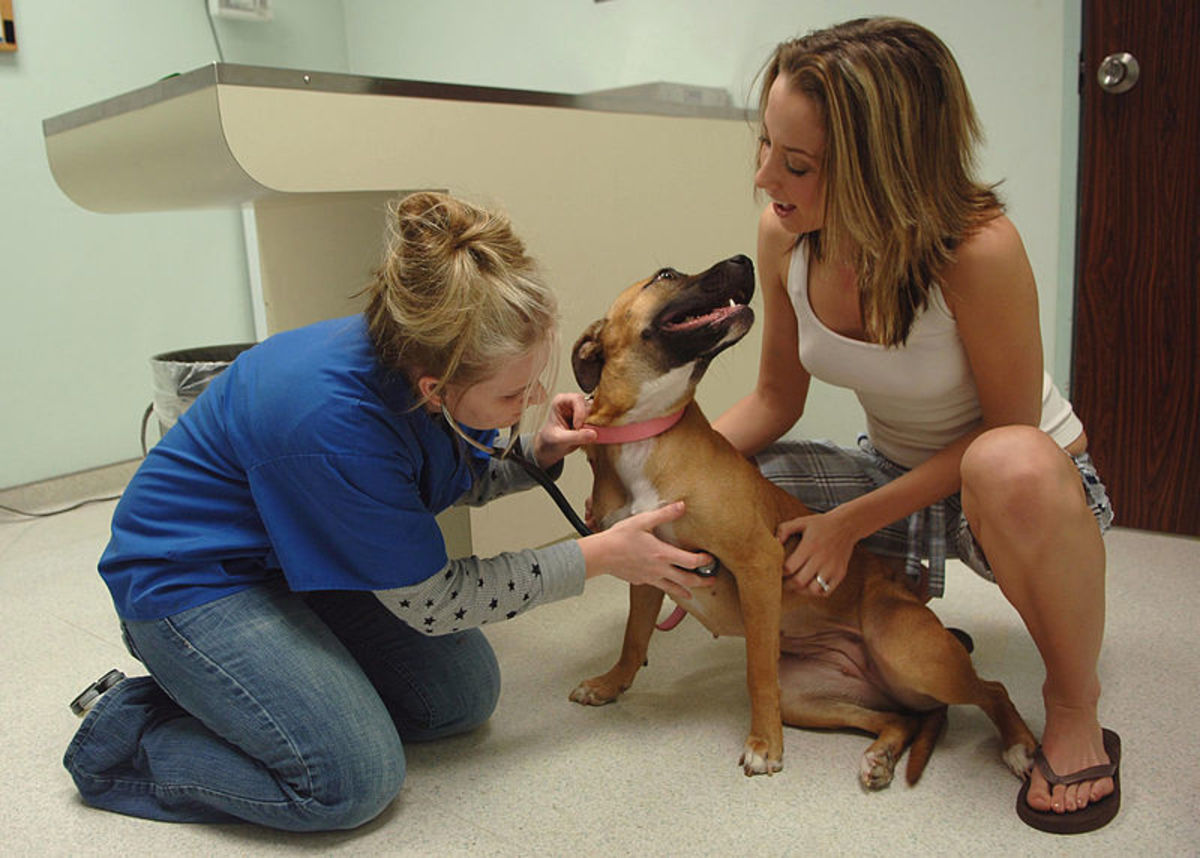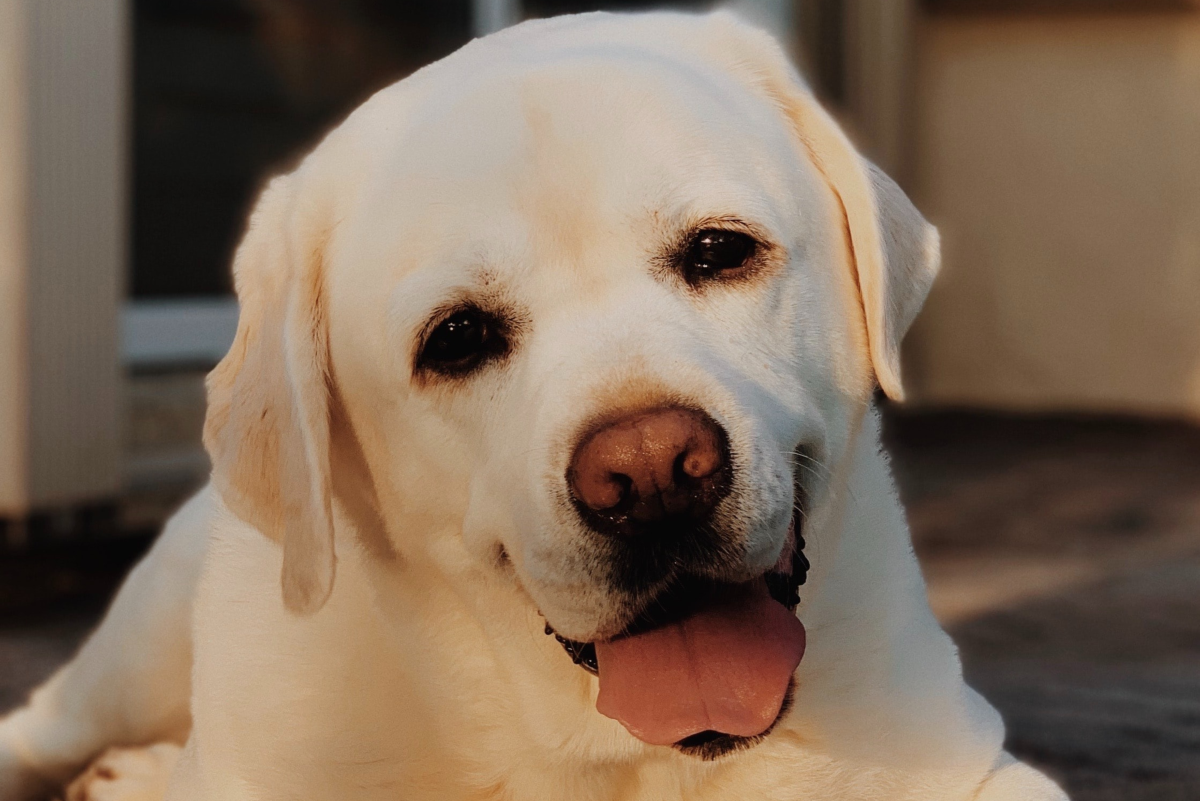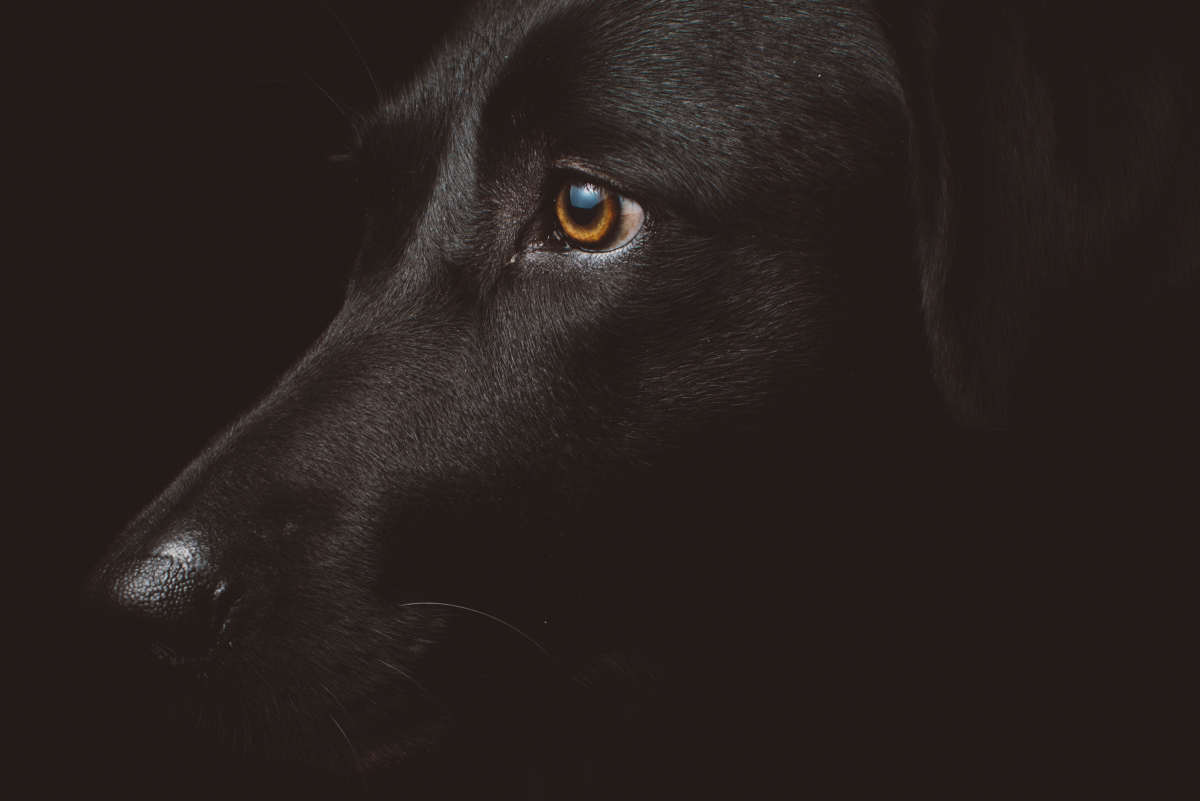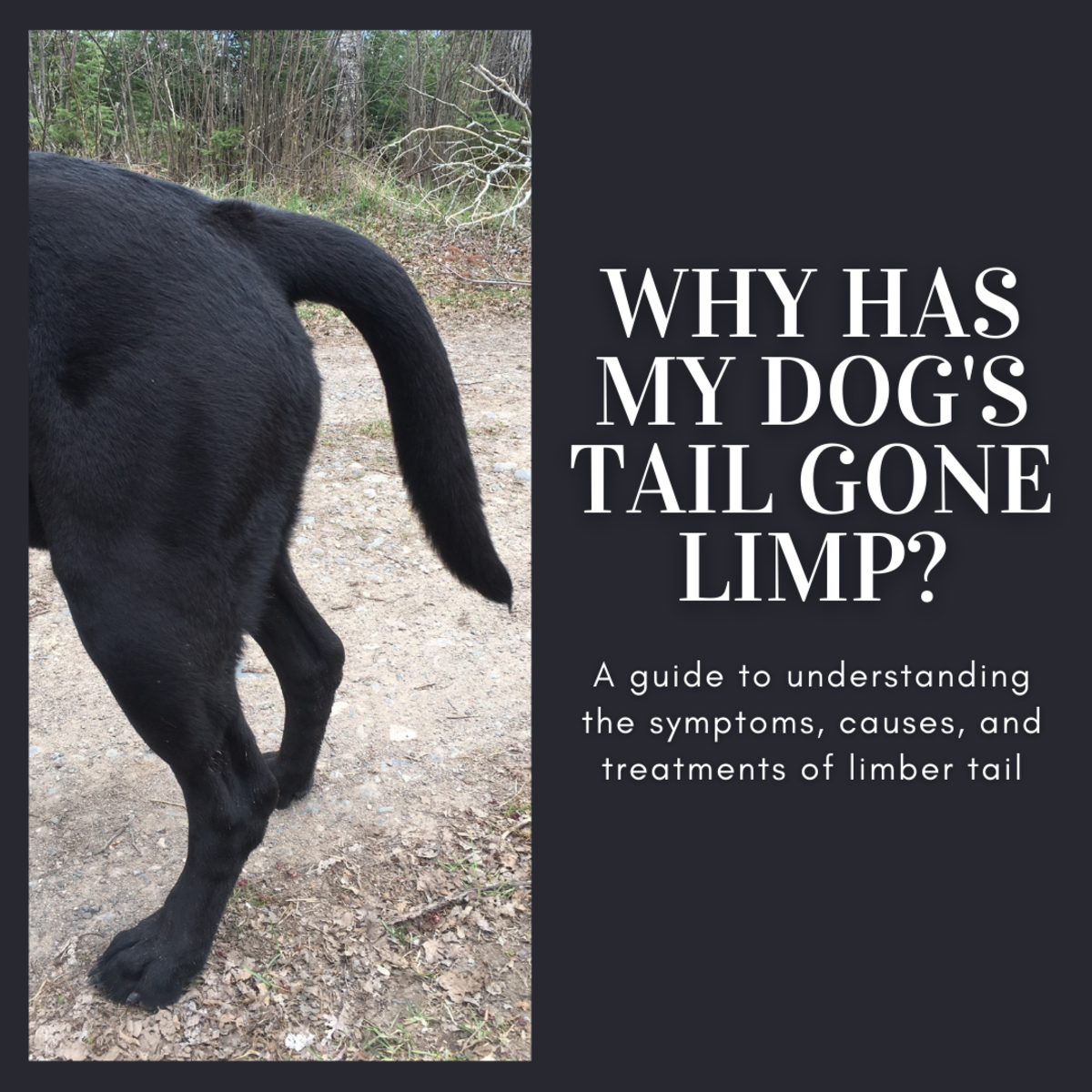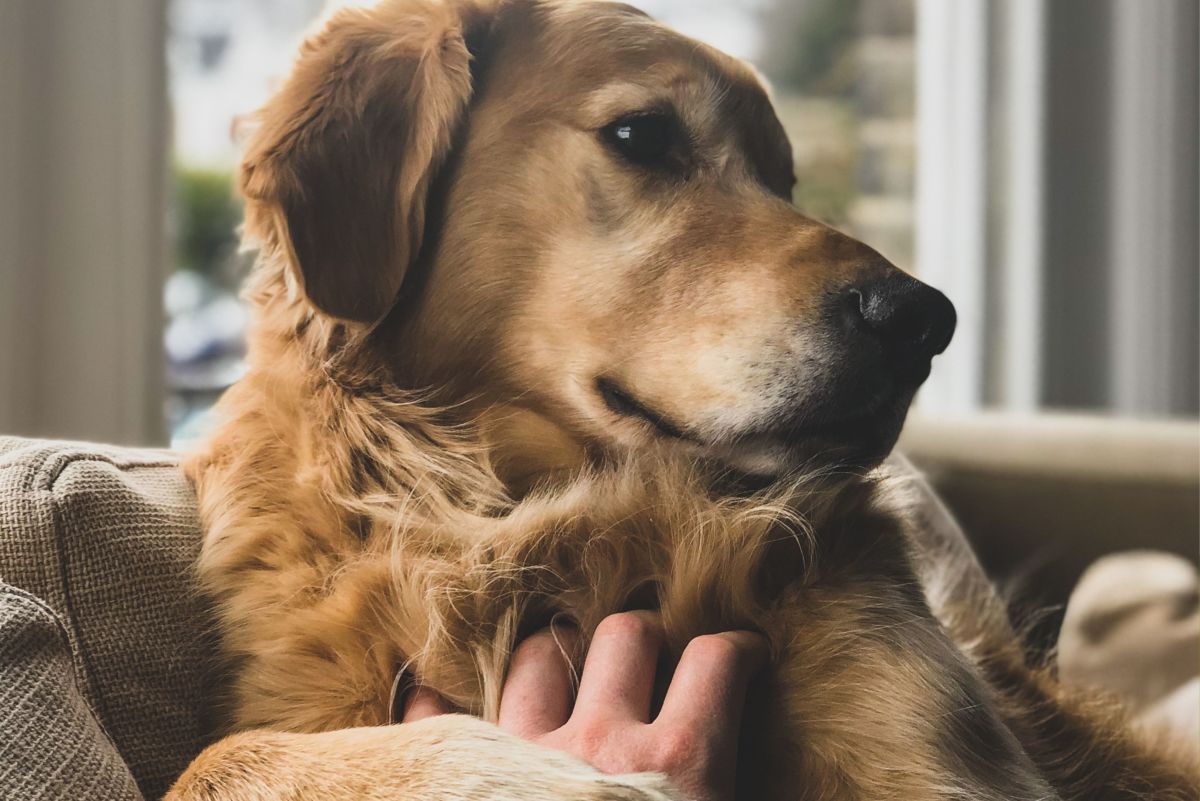Dog Cancer Guide - Signs, Treatment, Alternative Medicine, & Diet
Your Dog Has Cancer, What Next
No matter how old your dog is, it can be the hardest news to hear your veterinarian say, "Your dog has cancer." I've been there, and I'm battling it as best as one can, so remember that you are not alone, and no matter what decision you opt to make is never going to be the right one, but you have to make the best decision that you can for your dog.
You are always going to have doubts as to whether you are taking the right route in battling your dog's cancer, or doubts for the option not to take any treatment. Again, I know how you feel; all that you can do is think of the dog, the odds of the treatment options, and your financial situation.
In hopes to get some credibility to the situation, here's my quick story (of course I'm leaving out loads of details, but it'll be enough to share a quick picture):
At 18 months old, my American Pit Bull was sent to the Auburn Small Animal Vet after my local vet found two odd marks on an X-ray of her right front leg. The local vet was unsure as to whether the areas were bone cysts or bone tumors. The bone specialist in Auburn, advised us that we needed to remove the larger area, which consisted of 3 centimeters of bone so that if it is a bone cyst we treated it in surgery, if not then we have plenty to get a full biopsy; the smaller area was unreachable.
After 3 weeks and a full recovery of the initial surgery, the biopsy results came back as bone tumors, which is the most malicious cancer that a dog can get.
Great... My 18 month old puppy has cancer, what do we do? Well, it was never any doubt, we were doing something. She hadn't lived anywhere near her full potential as a dog.
The oncologist at Auburn advised us of out options, and they weren't pretty. So far, my Pit Bull is on chemotherapy treatments, until the leg starts to cause her any pain. When she starts showing signs of pain and lameness in the leg, we will be back to Auburn to discuss the next step, which will probably involve amputation and another round of chemotherapy.
Just remember not to act sad and depressed around the dog because he will not understand what he did wrong. Also remember that it is not your fault that your dog has developed cancer.
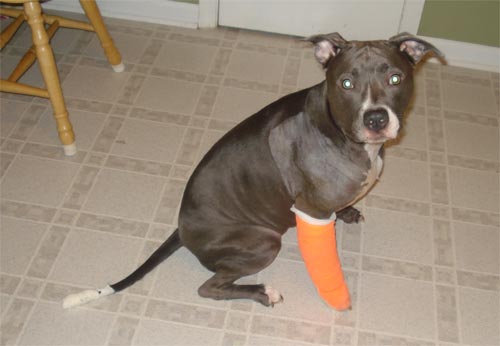

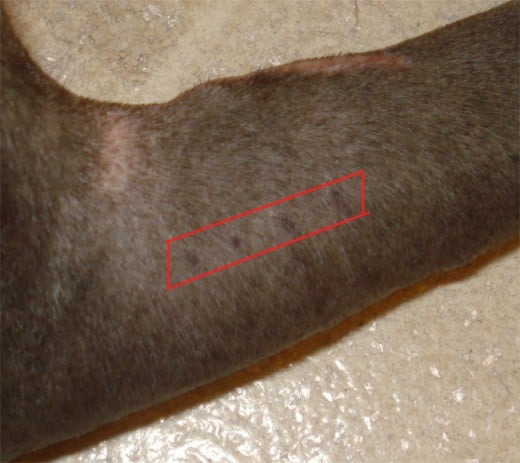
- First Sign of Cancer in My Dog
Basic overall signs of cancer in your dog. You will also find signs of the top types of cancer. - Common Dog Cancer
A quick overview of common types of canine cancer.
Signs of Cancer
You will find that cancer typically begins with few to no symptoms. You won't notice a sudden fever or spell of diarrhea or nausea. You just have to be alert and watchful of your dog's everyday actions. You should also know what health conditions your dog's breed is prone to developing.
A good way to catch your dog's cancer early on is by annual vet checkups that include a thorough hands-on exam, which should include looking in the dog's mouth. But that doesn't mean that you shouldn't regularly check your dog for lumps.
And, if you think that you feel a lump, don't worry just yet, as dog's are prone to many benign tumors such as cysts, sebaceous cysts, warts, papillomas, lipomas, hematomas, ear flap hematomas, histiocytomas, and perianal gland tumors. You vet will be able to diagnose the lump by doing a biopsy, which may either include a full removal of the lump or just extracting a few cells to examine under the microscope.
MIA (my APBT) has had both types of biopsies performed. The simple extraction of cells did not come to any conclusions, as even with 4 extractions not enough cells were grabbed. Sometimes a full biopsy procedure is necessary.
Because the signs of cancer can be similar with other health conditions, a vet will be the only person who will be able to properly diagnose the condition.
General dog cancer symptoms can include the following:
- Abnormal swelling and lumps
- Sores that won't heal
- Bleeding or discharge from the mouth, nose, urinary tract, rectum, or vagina
- Offensive odor
- Difficulty eating or swallowing
- Difficulty breathing
- Difficulty urinating or defecating
- Lethargy
- Loss of appetite and weight loss
- Persistent lameness or stiffness
Dog Cancer Biopsy Procedure
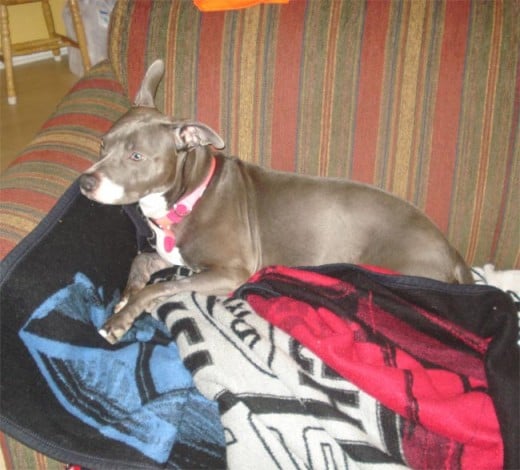
- Chemotherapy Treatment for Dogs
The basics of chemotherapy treatment and the effects your dog may experience. - Dog Cancer Treatment Options
Here's a quick over-view of the more common treatment options for dog cancer.
Cancer Treatment Options
The hardest thing to decide when you find out that your dog has cancer is what will the next step be. In some cases, it may be a clear cut and dry answer, but not everything is black and white, and sometimes you may have to go out of the box in order to make the best choice for your dog.
Remember that when choosing a treatment for your dog's cancer, you never want to do the selfish thing and do what you want to do, you want to do what is truly best for the dog. Meaning, if the odds aren't good and your dog is going to be put through a good bit of pain, then you may not want to consider the particular treatment option, especially if the dog is an elderly dog.
The treatment is probably going to be the toughest decision that you can make, but if you think that it is worth the try to you can financially afford it, then by all means, whatever is best for the dog is the option that you should take. Just remember that most dog cancer treatment options are going to be a bit pricey.
Common treatment for dog cancer can include the following options. Just remember that not all options are options that you may have, as not all cancers are receptive to all treatments. Your vet will be able to discuss with your the best options for your dog and the particular type of cancer that he has.
- Cryosurgery: Uses liquid nitrogen or other nitrous oxides to freeze the cancer cells. This treatment is primarily for superficial tumors such as in the eyelids, skin, mouth, and around the anus.
- Hyperthermia: The opposite of cryosurgery, where heat is used to kill the cance cells, typically in combination with chemotherapy or radiation. Although, not many vets have the capibility of this treatment, is is typically only used for growths less than one centimeter and is in the soft tissues.
- Photodynamic: A fairly new treatment that uses light-sensitive substances combined with a laser to damage the cancer cells. This can be useful for cancers less than two centimeters deep, such as basal and squamous cell sarcomas, as well as transitional cell carcinomas of the bladder.
- Radiation: Useful for cancer of the limbs, invasive tumors (such as chest, face, and mouth), and tumors that cannot be removed via surgery. Typically this is an option for low-grade tumors that are localized and metastasize late in the course of the cancer, but if the cancer has spread to internal organs, you may need to consider a combination of radiation and chemo. Radiation is not the best choice for tumors in the brain, spinal cord, or any intestinal cancers.
- Surgery: Small tumors that are easily accessible. Can include full amputation.
- Tumor- killing drugs: Typically, these are in the form of chemotherapy, which will attack the cells that rapidly divide. In many cases chemothereapy is used as the sole treatment, but it can also be used in combination with another treatment option. There are different types of chemotherapy medications that your vet can prescribe. Typically, these drugs are used to prolong the dog's life, not necessarily cure the cancer, although it is possible.
You will encounter different potential side effects with whichever treatment you consider, and it will be up to you and your veterinarian to decide if the treatment is worth the side effects and the statistical prognosis.
Dog Cancer Resources
Alternative Cancer Treatment Options
If you do not want to consider the above cancer treatment options, you may want to check out some of the holistic cancer treatments for your dog's cancer. Typically, these are considered alternative treatments, and they are not 100% proven effective.
First off, it is going to benefit your dog to get him on a high protein, low carbohydrate diet (see below for more information about what sort of diet you should consider putting your dog on). You should also consider various supplements (such as those below) to help your dog through his cancer, especially if you have opted for a more traditional method of treatment such as chemotherapy.
- Acupuncture is a traditional Chinese medicine that has been practiced for over 3,500 years. It is an alternative method of treatment that is aimed at strengthening the body's immune system and to stimulate the body's adaptive, homeostatic mechanism. This is a great alternative treatment for relieving pain and improving yoru dog's organ functions.
- Homeopathy dates back to the mid-1800s. It is an alternative treatment that involves a diluted toxic substance to help treat poisoned animals. Typically, homeopathic remedies are made from plants, minerals, drugs, viruses, bacteria, or other substances. They are used to suppress the symptoms of the cancer and potentially treat the cause of the illness. Generally, herbs such as North American, Aryuvedic, and Chinese herbs are used to help balance the emotional, mental, and physical symptoms.
- Chiropractic is a method of alternative treatment that is used to treat a variety of illnesses, typically related to the spine, bones, joints, and muscles. Many people beleive that by adjusting the vertebra, you can help alleviate the problem and the body's homeostasis is restored.
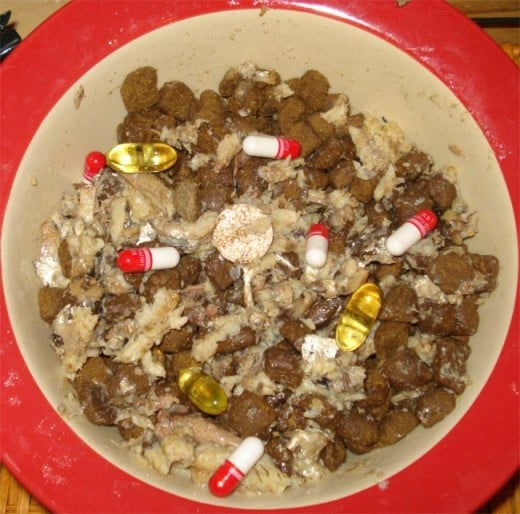
Commercial Dog Diet
- EVO Innova Diet
EVO is a grain-free dog food that delivers a high protein diet, which is a perfect diet for your dog with or without cancer. Just be aware that in its dry form, it is very dry, and you should ensure that you dog has ample water available.
Homemade Cancer Diets
- Jerry's Diet and Supplements
Tripawds.com presents comprehensive health and diet tips for canine cancer survivors of osteosarcoma and other three-legged dogs. - Beanny's Anti-cancer diet for dogs
Beanny's anti-cancer diet was developed from vast array of resources, and involves a full daily diet. - Cancer Diet
California Veterinary Specialists Angel Care Cancer Center for Animals. We are a veterinarian group offering a variety of medical, surgical, radiological, nutritional, physical and supportive options for treating cancer in pets.
Dog Cancer- Diet Changes
Your dog's diet is important whether he has cancer or not, but since you've found out that your dog does have cancer, you want to make sure that you pay special attention to what you dog eat, especially since some cancer cells will react differently to different types of foods and may even fuel the spread.
You want to stick with foods that are easy to digest and appeals to your dog's sense of taste and smell. You want your dog's staple diet to be high in proteins and both soluble and insoluble fibers, but you want it low in carbohydrates.
Because cancer cells are fueled by carbs (sugars) and cannot absorb fats, you want your dog's diet rich in fats, as the healthy cells will absorb the fats. By limiting both the simple and complex sugars that your dog ingests, you will be able to starve the cancer cells by avoiding sugars.
Try to have a staple diet of:
- High fat (55-60%)
- Moderate protein (18-22%)
- Low carbohydrate (3-13%)
You want to increase the proteins by including egg whites, white meat chicken, lean beef, fish (cold water fish, such as salmon or sardines are better than warm fish, such as tuna), sardines, beans, skim milk, and lamb into the diet.
You may also want to consider adding a small bit of olive oil to the dog's diet, as it is a good source of Omega 3.
By changing the dog's diet you can actually improve your dog's immune system, especially if you alter the dog's diet to include more proteins and fewer carbohydrates.
My American Pit Bull Terrier gets a half a can of Albacore or 3-6 sardines with the egg white from 1 boiled egg twice a day in addition to loads of supplements to enhance her immune system, in addition to her EVO dry food. She receives a can of EVO dog food every other day to boost her hydration levels.
A high protein diet can affect the kidneys and water level in the body, so you want to make sure that your dog is getting plenty of water.
Limit the Following Carbohydrates
Make sure that you know where your dog is getting his carbs from? There are simple and complex sugars that you should watch out for.
Complex Sugars:
- Bread
- Cereal
- Grain
- Rice
- Potatoes
- Vegetables and fruits
- Pasta
Simple Sugars:
- Rice syrup
- Molasses
- Honey
- Corn syrup
- Maple sugar or syrup
- Glucose, sucrose and dextrose.
- Milk
- Carrots, beets, squash, turnip and sweet potatoes
Raw Beef Heart and Liver for Jerry the Three Legged Dog
- K9 Dietary Supplements
Natural dietary dog supplements for a healthy dog. You'll find the K9 brand of immunity supplements. The "Critical Care Super Cancer Power Pack" is ideal for dogs with cancer. You receive K9 Critical Care, Transfer Factors, and Omega supplements.
Supplements
Supplements are always a good additive to your dog's diet, whether he has cancer or not. There are many people who practice holistic medicines that believe some supplements can prevent cancer, disease, and other illnesses. The following supplements are great to add to your dog's diet, especially if you have the dog on a traditional cancer treatment such as chemotherapy and even radiation. The added supplements and nutrients to the dog's diet will help alleviate the side effects of the treatment and potentially boost immune system functions for a better prognosis.
In my dog's daily bowl of EVO Innova, we give her the K9 Immunity supplements as well as K9 Transfer Factors and K9 Omega 3, to increase her immunities while she is on chemo.
Supplements that are suggested include:
- Arginine
- Beta-carotene
- Black tea extract-decaffeinated
- Flax seed oil
- Garlic
- Ginkgo bilboa
- Glutamine
- Green tea extract- decaffeinated
- Grape seed extract
- Iron
- Kelp powder
- Selenium
- Therapeutic enzymes (especially those with L-asparaginase)
- Quercetin
- Vitamin A
- Vitamin C
- Vitamin E
Other supplements that you will want to ask your vet about the full effect and dosage informan include:
- Astragalus- antiviral and immune-boosting effects
- Cat's Claw- thought to have anti-tumor properties against central nervous system cancers; thought to lead towards remission of brain and other tumors
- Echinacea- aid immune system
- Milk thistle- protect the liver from damage during chemotherapy
- Pau D'Arco- anti-cancer and anti-inflammatory effects
- Reishi and Maitake Mushrooms- aid immune system and activate NK killer cells that attack cancer cells and prevent destruction of T-cells
- Shark cartilage- reduces tumor blood flow
Ruffwear Harness
Dog Cancer Information: National Medical Report
Disclaimer: Please be aware that the advice in this article should in no way replace that of a licensed veterinarian. If you have any questions or concerns, you should consult a veterinarian.





